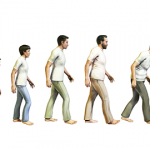According to the American Medical Association (AMA), nearly one-quarter of American physicians are 65 or older, and 40% of them remain actively involved in patient care.12 Some of these senior physicians keep going strong, working 50–60–hour weeks as they have always done. For others, there is a slowing of the practice of medicine as their referral sources begin retiring themselves and a once robust stream of patient consultations turns to a trickle. The message becomes evident: There is little point in sitting in an empty clinic. For some doctors, the deciding point is reached when their practice installs a mind-numbing electronic health record system (EHR) that becomes overwhelming. This was the case at my institution a couple of years ago when several colleagues chose not to gain proficiency in learning to operate through a maze of redundant templates and instead chose to head out the door. It was an epic loss for many programs as some of their wisest clinicians departed for technical reasons.
How are healthcare systems coping with aging? To detect cognitive impairment before it becomes a clinically harmful matter, several have started adopting age-related physician policies. This has roiled some older physicians, including those at Stanford Medical Center in Palo Alto, Calif., who succeeded in getting their hospital to scrap a mental competency exam, arguing that such policies are discriminatory and should apply to physicians of all ages. Once a hospital has entered the screening business, why not screen for drug and alcohol addiction at all ages?11 Instead, Stanford created a late-career practitioner policy that solicits peer reviews of physicians aged 75 and older from people with whom they work. This did not sit well with Saul Rosenberg, MD, emeritus professor of medicine at Stanford who pioneered the curative radiation therapy treatment for Hodgkin’s lymphoma, a once fatal disease. At age 89, he continues to practice and stresses, “I am quite elderly, and I know what I know, and I know what I don’t know.”12
Will administrators and the general public accept this view? Because hospital administrators have an innate tendency to replicate the work of their peers, don’t be surprised to see similar policies sprouting up at your place of practice sometime soon.
Physician, Time to Heal Thyself
A word of caution before we embark on this headlong rush to assess the cognitive skills of our septuagenarian colleagues. Health quality experts who have studied the issue of the aging physician, including Anupam Jena, MD, PhD (age 38), associate professor of medicine at Harvard Medical School in Boston, and Martin Makary, MD, MPH (age 44), professor of surgery at the Johns Hopkins Hospital in Baltimore, are reticent to conclude that older physicians are more harmful to their patients. Dr. Jena has questioned the emphasis on mental competence. He believes that poor outcomes may be due to outdated skills rather than cognitive decline. In his view, older doctors may not perform as well as their younger peers, “not because of cognitive impairment but because of their relative lack of familiarity with current treatments.”12 In fact, his group’s recent, well-publicized study showing that patient mortality rates rose with the age of the treating hospitalist also found that those doctors who maintained a patient volume equal to their younger peers, had similar mortality rates.11


